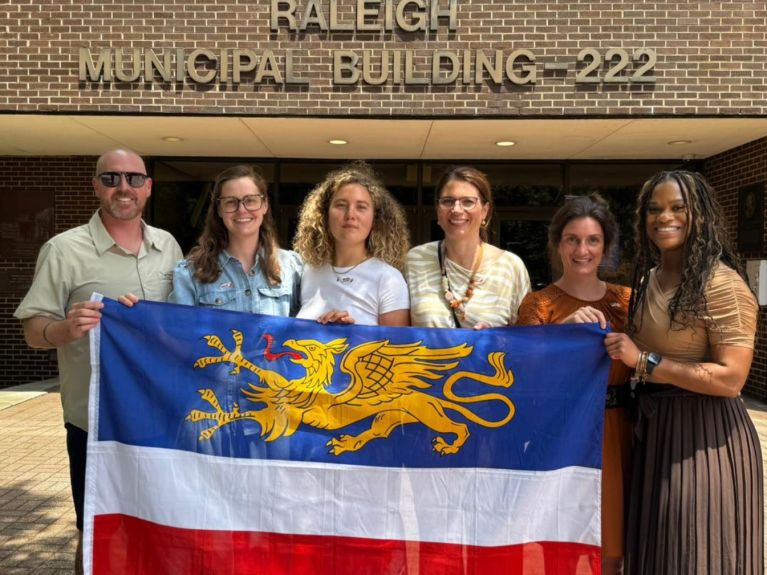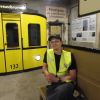Twinned cities: It’s about trust, exchange and humanity
200 city partnerships between Germany and the USA fortify transatlantic exchange and unite people on multiple levels.

Esslingen in Baden-Württemberg and Sheboygan in the US State of Wisconsin have nurtured their partnership for over 50 years. Esslingen is located on the Neckar River and Sheboygan on Lake Michigan. Water connects them, as does the battle against climate change. Heat stress is increasing in each city and agriculture is suffering in both Esslingen District and Sheboygan County – either due to drought or heavy rainfall with flooding. How can urban areas remain liveable? How are the twin cities either side of the Atlantic girding themselves?
Common problems, common solutions
Be it climate change or structural transition, transport planning or residential construction, immigration, integration, participation or social harmony in each city – the challenges are the same, whether they have to be tackled by the local government of a German or a US city. The Urban Diplomacy Exchange (UDE) project, implemented by Engagement Global, has been assisting German-American and German-British city partnerships since 2021. As part of the transatlantic exchange, UDE brought together numerous German and American mayors at two meetings in New York in June 2024 and in Bremen in October 2025.
“It’s all about establishing direct contact between German mayors and the mayors and local politicians in their partner cities in the USA”, explains Livia Pichorner, project lead at Urban Diplomacy Exchange. “This includes cooperation between municipal departments at the working level.” In terms of content, the various exchange formats include conferences and specialist exchange trips, and they address topics within the context of the United Nations’ 17 Sustainable Development Goals (SDGs).
Greater understanding, education and interaction
“At a time when many citizens worldwide may feel that their national leaders do not reflect their views, local diplomacy provides an opportunity to add color and nuance to our understanding of one another”, says Megan Patton. She is a city councillor in Raleigh in the US State of North Carolina, and among other things is responsible for nurturing the city partnership with Rostock in Mecklenburg-Vorpommern.
In June 2025, Raleigh welcomed a delegation from its North German partner city within the scope of the Urban Diplomacy Exchange. Megan Patton greatly appreciates such encounters: “As a policy maker, I benefit from hearing about comparable challenges and unique solutions”, she says. There are for instance parallels in the aspects of affordable housing, complex cooperation between authorities and investing in infrastructure for the future. “Our shared values of education and sustainability provide opportunities for partnership between our universities”, she adds, “and our shared commitment to tourism offers a chance to collaborate on travel related initiatives.”
“Trust has grown more than ever before”
Ivana Stijelja, who heads the International Affairs Department in the office of the Mayor of Rostock, believes that the high-level meetings on urban policy provide valuable support for the partnership with Raleigh, which has been in place for over 20 years. “We’ve been working successfully with the Raleigh Sister Cities association for a long time, but the working level needs support from local politicians to enable good ideas to be implemented.” Cody Charland, her counterpart at Raleigh Sister Cities, emphasises: “Our relationships and trust have grown more than ever before.”
It involves humanity, cooperation and the exchange of knowledge
The partner cities Esslingen and Sheboygan are also using urban diplomacy to intensify their decades-long affinity. “My recent visits to Esslingen have been particularly worthwhile”, says Mayor Ryan Sorensen, the young and cosmopolitan mayor of Sheboygan. He is, for example, impressed that Esslingen uses its specially created analysis map of the city when adapting to climate standards. “We’re learning about various aspects where Esslingen is more advanced than we are, which we can then take back and use to advance important initiatives in Sheboygan.” This has enabled Sorensen to resurrect an urban reforestation programme to reduce heat. “We’re also reviewing how we too can modernise our infrastructure to create safer sidewalks and more accessible cycle paths.”
Understanding and friendships
Katrin Radtke, who is responsible for international affairs at the City of Esslingen, believes that such interaction reveals transatlantic relations to signify much more than just politics between Berlin and Washington. “We have networked our fire department with that in Sheboygan, because we’re receiving more and more emergency calls in English”, she reports. The virtual interaction between German fire department and American firefighters is referred to as “coffee talks” – actually a format for practising English, but one that also fosters understanding and friendships. It also provides guidance through turbulent times in terms of state policy, Sorensen believes: “It involves humanity, cooperation and the exchange of knowledge with respect to shared resilience.”


